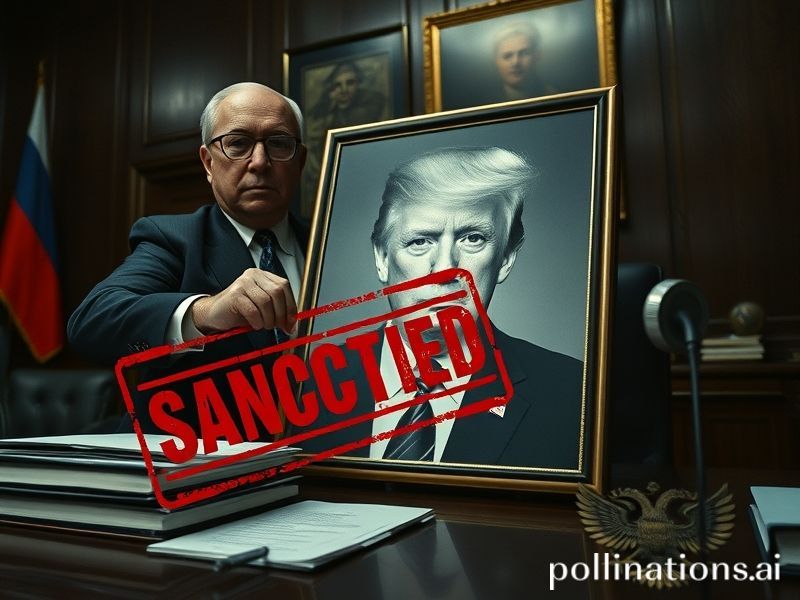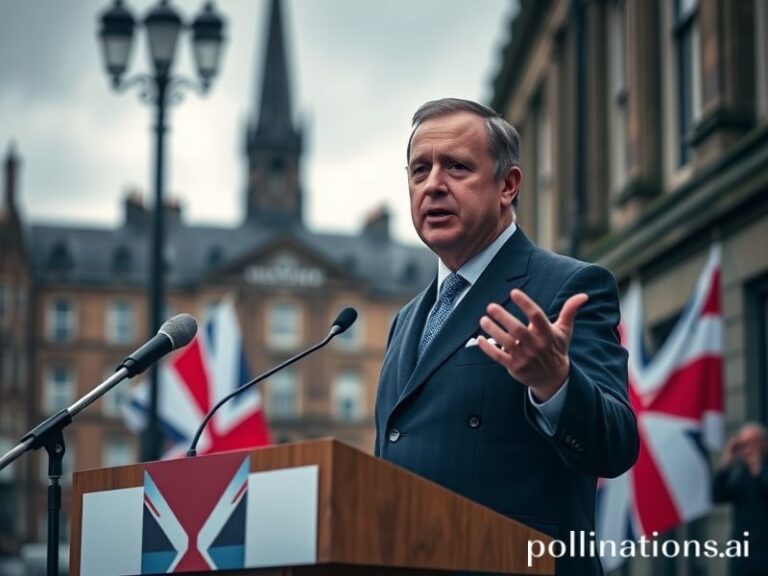Sanctions, Trump, and the Great Russian Shell Game: A Global Farce in Three Acts
Moscow, Washington, and the Art of the Sanctioned Deal
—————————————-
On Monday, while the rest of the planet was doom-scrolling about the price of eggs, the U.S. Treasury Department quietly unfurled a fresh bouquet of sanctions aimed at the Russian financial nervous system. The timing was delicious: just as Donald Trump’s legal calendar began to resemble a Moscow-to-Magadan train timetable—long, frigid, and full of unscheduled stops—official Washington decided to remind everyone that the Cold War never really ended; it merely went on furlough and came back with better Wi-Fi.
The new measures slice deeper into Russia’s “shadow fleet” of tankers, whack another dozen banks, and personally name-check the sort of oligarch who keeps a Monet in the guest bathroom. Treasury’s boilerplate insists these steps will “further degrade the Kremlin’s capacity to wage its illegal war.” Translation: we’re trying to make Putin check his pockets for spare change before ordering another missile barrage at a Ukrainian power plant.
Global Implications, or How to Ruin Everyone’s Tuesday
——————————————————
Europe, still nursing its winter gas bill like a hangover, offered the diplomatic equivalent of a polite golf clap. Brussels has discovered that moral outrage is cheaper when it doesn’t involve turning off radiators. Meanwhile, China—ever the friend who shows up late with cheap wine—issued a statement urging “all parties to remain calm,” which is Mandarin for “please keep buying our semiconductors.” India shrugged, purchased another cargo of discounted Urals crude, and went back to arguing on Twitter about cricket.
Emerging markets watched the rouble wobble and collectively remembered why keeping dollars under the mattress still feels prudent. From Lagos to Lima, central bankers updated their contingency playbooks: Step 1, call the IMF; Step 2, pretend the IMF’s conditions were your idea all along.
Enter the Elephant in the Red Hat
———————————
Which brings us to the subplot that keeps cable-news chyrons gainfully employed: Donald J. Trump, currently juggling 91 felony counts across four jurisdictions, has promised to “settle” the Ukraine war “in 24 hours” if re-elected. One can only assume the plan involves a motivational seminar and a two-for-one coupon at Mar-a-Lago. The sanctions package therefore doubles as a pre-emptive straitjacket: the Biden administration is essentially tying future-President Trump’s hands with enough red tape to gift-wrap the Washington Monument.
International observers, sipping espresso in Geneva conference rooms, note the exquisite irony. The same America that once weaponized globalization now worries its own electoral cycle might weaponize de-globalization. Picture the world’s risk managers huddled over Bloomberg terminals, praying that swing-state voters treat geopolitics with the same sobriety they reserve for karaoke night.
Human Nature, Supply Chains, and Other Punchlines
————————————————-
Sanctions, like diets, work best in theory. In practice, Russian firms have become the Houdinis of commerce: every time Washington cinches the straitjacket, another shell company pops up in the Seychelles. The International Energy Agency reports Moscow is still earning roughly $700 million per day from fossil exports—enough to fund both missiles and the annual oligarch yacht maintenance budget, which, coincidentally, also keeps German dry-dock workers employed. It’s the circle of life, scored to the faint clink of champagne flutes.
Broader Significance: A World Taped Together with Sarcasm
———————————————————
What we are witnessing is not merely a sanctions update but the ongoing erosion of a rules-based order nobody actually reads the rules to anymore. Every restriction spawns a workaround; every workaround mints a new middleman; every middleman eventually buys British football real estate. Meanwhile, the rest of us stock up on canned goods and pretend we understand yield-curve inversions.
In the end, sanctions are less a scalpel than a blunt household hammer applied to a leaky pipe: the leak may slow, but the basement still floods, and someone always forgets to turn off the mains. The international community will keep issuing statements of concern, markets will do whatever markets do (mostly panic, then brunch), and somewhere in a Moscow suburb an accountant will rename an oil tanker after his pet dachshund.
The final punchline? The sanctions will endure, the war will grind on, and the 2024 U.S. election will probably be decided by voters who can’t locate Crimea on a map. Pass the popcorn—just check the label for country of origin first.







